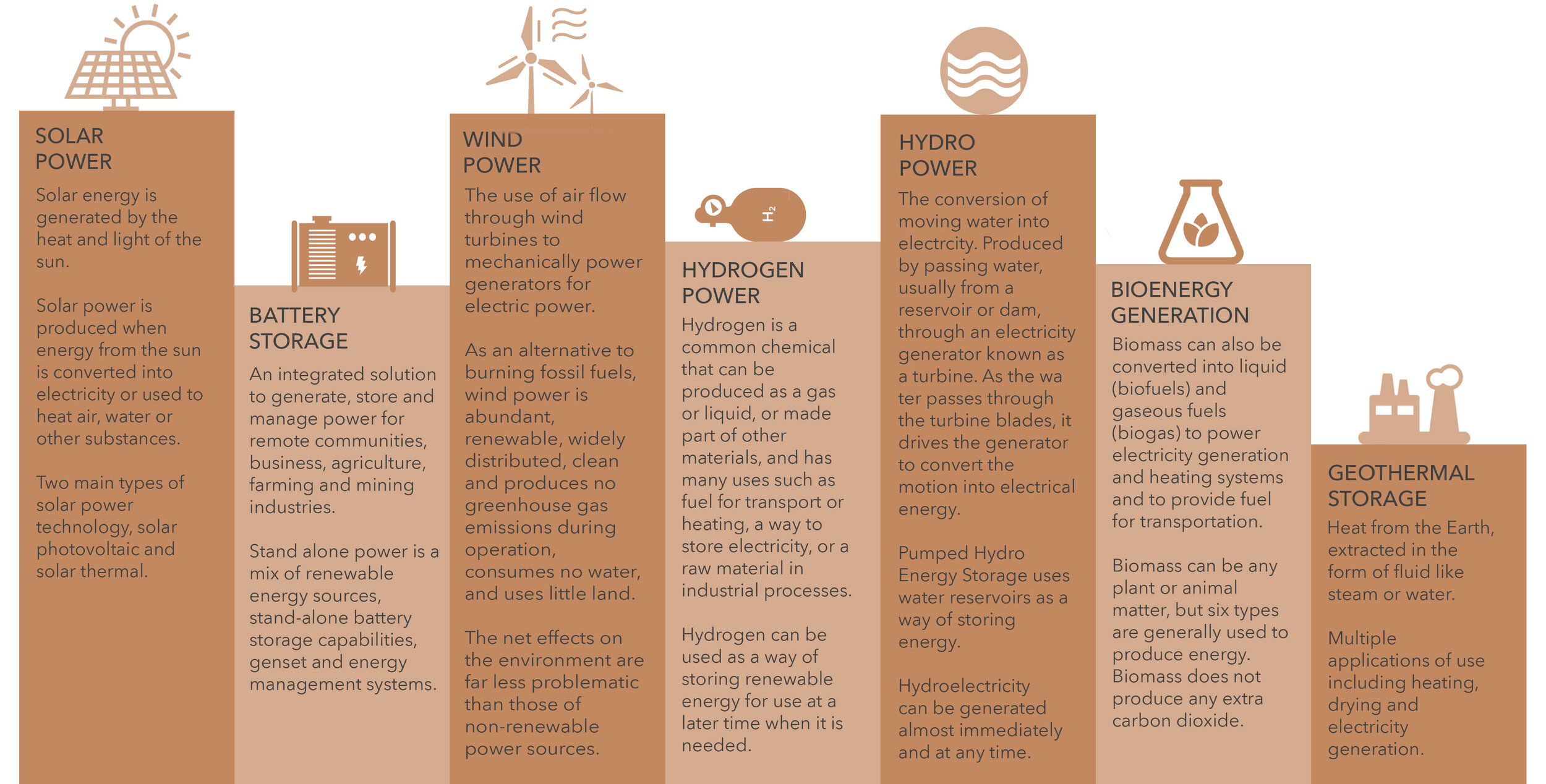We believe renewable energy solutions can offer the agricultural industry an opportunity to harness the unique Australian landscape.
Our desire is to empower remote communities and agricultural businesses through the use of innovative technologies; addressing energy consumption, efficiency and costs in a changing energy environment.
opportunity BENEFITS: control your energy
Opportunities exist for industry to better control energy costs by improving practices and systems, changing or modifying equipment/technology, switching to alternative, less expensive energy sources and purchasing energy more strategically.
COST SAVINGS
Optimised renewable sources can help lower energy purchase costs, like diesel generators. This change affects fuel consumption, logistics and leads to longer requirement intervals and less maintenance costs due to the prolonged service life. As well as automated control systems which protect equipment, reduce maintenance costs and extend equipment life.
CO2 REDUCTION
Integrating renewable sources allows you to avoid fossil fuels on your farm, like diesel which in turn reduces CO₂ emissions. This reduces your overall environmental footprint, including effects like reduced engine noise and avoidance of shipping hazards with harmful fuels. Along with multiple environmental benefits, both on-farms and for the broader environment and communities.
ENERGY + CARBON MARKET
It’s possible to reduce grid fees and to create additional revenue by selling surplus energy to the energy market. Surplus energy generated can be sold directly to other users or into the energy market. Verifiable carbon reductions or other environmental credits can be claimed through government or privately-supported market exchanges.
SECURITY + FLEXIBILITY
Availability and reliability of power supply is a crucial factor to increase resilience. Renewable sources generate reliable and stable power supply to safeguard production, operations and higher independence. Renewables also supplement existing energy sources; a producer who can generate energy can make market based decisions as to when to buy or sell energy.
power supply: what it could look like?
Due to the nature of remote locations, there is generally little to no grid access available, contributing to unstable fluctuating power and data supply. Diesel generators are often used as the power solution, leading to high fuel consumption and maintenance costs. Our solutions combine a mix of renewable energy sources, stand-alone battery storage capabilities, diesel off-setting, and energy management systems to ensure power supply is reliable, cost-effective, sustainable for the long term, and optimises a high level of energy efficiency.
finding the right solution: micro grids
The markets may be different, but the challenges are similar: rising energy costs, fluctuating power quality, and the need for CO₂ reduction. For many commercial and industry users microgrid energy solutions hold the answer.
STAND ALONE POWER SYSTEM (sap).
Stand Alone Power Systems (SAPS) are self-sufficient energy systems that are not connected to the main electricity grid. They are designed to generate, store, and distribute electricity independently. These systems are particularly useful in remote areas where grid connection is impractical or too costly.
saP ENVIRONMENTS.
Agriculture
Off-grid agricultural sites often have little to no grid access, and the access if existing is weak and fluctuating. Diesel generators are then the common use of power generation, leading to high fuel and maintenance costs.
Remote Islands
A location that is limited by services, infrastructure and consistent energy supply. These locations can benefit from harnessing renewables forms of energy. Especially when these locations are impacted with the threat of rising sea levels and global warming.
Resorts/Hotels
An opportunity to educate and inspire guests through the design, technology and user experience of a renewable energy run facility. The integration of SAP systems will also contribute to lower operation costs, and reliance on diesel run generators.
Mining
Mining sites are remote for a reason and in turn are out of reach of the electricity grid. Nearly half of all operating costs are spent on diesel generators.
Manufacturing
Power, heat and cooling are important factors for a high demand industry like manufacturing. Facilities like food and beverage for example require a resilient and continuous power supply, crucial for business cohesion and safety. Commonly diesel generators are used.
Infrastructure
Facilities and campuses, like universities, hospitals and airports all seek economic efficiency. Energy integration and efficiency is a key success to economic efficiency of any building, along with the sustainable approach like emission reduction and financial freedom.
ON-FARM RENEWABLE SCENARIO.
The industrial-scale farm is unable to receive enough power supply from the grid connection to support its production. Diesel generators are generally the most commonly used source of power generation. One or multiple renewable energy sources can be applied to this scenario, combined with energy storage capacities and monitoring systems to offset diesel and enhance grid stability; along with power quality and reduction in energy consumption and costs.
HOW WE WORK: our engagement
We support projects with comprehensive planning and implementation support and financing solutions that meet the project’s requirements.
We offer a 360-degree approach from on-site assessments, feasibility studies, engineering, planning and designing; through to implementing and connecting high penetration renewables and diesel off-setting system.
Turnkey solutions, for the generation of power, heating and cooling
Tailor-made solutions for energy storage
Controlling local energy supply and independent operation








